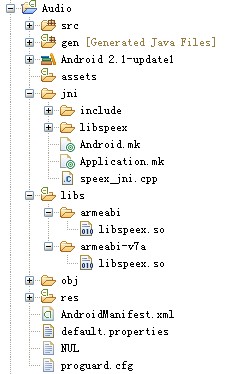Speex for Android
在Android开发中,需要录音并发送到对方设备上。这时问题来了,手机常会是GPRS、3G等方式上网,所以节省流量是非常关键的,使用Speex来压缩音频文件,可以将音频压文件小数倍。
1.去Speex官网下载最新Speex源码。
2.创建一个新的应用(我创建的应用名为Audio),并创建一个jni目录($project/jni)。
3.把speex源码目录下的libspeex和include目录及其子目录文件全部拷贝到$project/jni目录下($project/jni/libspeex and $project/jni/include)。
4.在jni目录下新增Android.mk文件,编辑内容如下
- LOCAL_PATH := $(call my-dir)
- include $(CLEAR_VARS)
- LOCAL_MODULE := libspeex
- LOCAL_CFLAGS = -DFIXED_POINT -DUSE_KISS_FFT -DEXPORT="" -UHAVE_CONFIG_H
- LOCAL_C_INCLUDES := $(LOCAL_PATH)/include
- LOCAL_SRC_FILES := \
- ./speex_jni.cpp \
- ./libspeex/bits.c \
- ./libspeex/buffer.c \
- ./libspeex/cb_search.c \
- ./libspeex/exc_10_16_table.c \
- ./libspeex/exc_10_32_table.c \
- ./libspeex/exc_20_32_table.c \
- ./libspeex/exc_5_256_table.c \
- ./libspeex/exc_5_64_table.c \
- ./libspeex/exc_8_128_table.c \
- ./libspeex/fftwrap.c \
- ./libspeex/filterbank.c \
- ./libspeex/filters.c \
- ./libspeex/gain_table.c \
- ./libspeex/gain_table_lbr.c \
- ./libspeex/hexc_10_32_table.c \
- ./libspeex/hexc_table.c \
- ./libspeex/high_lsp_tables.c \
- ./libspeex/jitter.c \
- ./libspeex/kiss_fft.c \
- ./libspeex/kiss_fftr.c \
- ./libspeex/lpc.c \
- ./libspeex/lsp.c \
- ./libspeex/lsp_tables_nb.c \
- ./libspeex/ltp.c \
- ./libspeex/mdf.c \
- ./libspeex/modes.c \
- ./libspeex/modes_wb.c \
- ./libspeex/nb_celp.c \
- ./libspeex/preprocess.c \
- ./libspeex/quant_lsp.c \
- ./libspeex/resample.c \
- ./libspeex/sb_celp.c \
- ./libspeex/scal.c \
- ./libspeex/smallft.c \
- ./libspeex/speex.c \
- ./libspeex/speex_callbacks.c \
- ./libspeex/speex_header.c \
- ./libspeex/stereo.c \
- ./libspeex/vbr.c \
- ./libspeex/vq.c \
- ./libspeex/window.c
- include $(BUILD_SHARED_LIBRARY)
5.在jni目录下新增Application.mk文件,编辑内容如下
- APP_ABI := armeabi armeabi-v7a
6.在$project/jni/include/speex/目录下新增speex_config_types.h文件,编辑内容如下
- #ifndef __SPEEX_TYPES_H__
- #define __SPEEX_TYPES_H__
- typedefshort spx_int16_t;
- typedef unsigned short spx_uint16_t;
- typedefint spx_int32_t;
- typedef unsigned int spx_uint32_t;
- #endif
7.创建JNI包装类speex_jni.cpp,用来调用Speex中的C代码函数,编辑内容如下
- #include <jni.h>
- #include <string.h>
- #include <unistd.h>
- #include <speex/speex.h>
- staticint codec_open = 0;
- staticint dec_frame_size;
- staticint enc_frame_size;
- static SpeexBits ebits, dbits;
- void *enc_state;
- void *dec_state;
- static JavaVM *gJavaVM;
- extern"C"
- JNIEXPORT jint JNICALL Java_com_audio_Speex_open
- (JNIEnv *env, jobject obj, jint compression) {
- int tmp;
- if (codec_open++ != 0)
- return (jint)0;
- speex_bits_init(&ebits);
- speex_bits_init(&dbits);
- enc_state = speex_encoder_init(&speex_nb_mode);
- dec_state = speex_decoder_init(&speex_nb_mode);
- tmp = compression;
- speex_encoder_ctl(enc_state, SPEEX_SET_QUALITY, &tmp);
- speex_encoder_ctl(enc_state, SPEEX_GET_FRAME_SIZE, &enc_frame_size);
- speex_decoder_ctl(dec_state, SPEEX_GET_FRAME_SIZE, &dec_frame_size);
- return (jint)0;
- }
- extern"C"
- JNIEXPORT jint Java_com_audio_Speex_encode
- (JNIEnv *env, jobject obj, jshortArray lin, jint offset, jbyteArray encoded, jint size) {
- jshort buffer[enc_frame_size];
- jbyte output_buffer[enc_frame_size];
- int nsamples = (size-1)/enc_frame_size + 1;
- int i, tot_bytes = 0;
- if (!codec_open)
- return 0;
- speex_bits_reset(&ebits);
- for (i = 0; i < nsamples; i++) {
- env->GetShortArrayRegion(lin, offset + i*enc_frame_size, enc_frame_size, buffer);
- speex_encode_int(enc_state, buffer, &ebits);
- }
- //env->GetShortArrayRegion(lin, offset, enc_frame_size, buffer);
- //speex_encode_int(enc_state, buffer, &ebits);
- tot_bytes = speex_bits_write(&ebits, (char *)output_buffer,
- enc_frame_size);
- env->SetByteArrayRegion(encoded, 0, tot_bytes,
- output_buffer);
- return (jint)tot_bytes;
- }
- extern"C"
- JNIEXPORT jint JNICALL Java_com_audio_Speex_decode
- (JNIEnv *env, jobject obj, jbyteArray encoded, jshortArray lin, jint size) {
- jbyte buffer[dec_frame_size];
- jshort output_buffer[dec_frame_size];
- jsize encoded_length = size;
- if (!codec_open)
- return 0;
- env->GetByteArrayRegion(encoded, 0, encoded_length, buffer);
- speex_bits_read_from(&dbits, (char *)buffer, encoded_length);
- speex_decode_int(dec_state, &dbits, output_buffer);
- env->SetShortArrayRegion(lin, 0, dec_frame_size,
- output_buffer);
- return (jint)dec_frame_size;
- }
- extern"C"
- JNIEXPORT jint JNICALL Java_com_audio_getFrameSize
- (JNIEnv *env, jobject obj) {
- if (!codec_open)
- return 0;
- return (jint)enc_frame_size;
- }
- extern"C"
- JNIEXPORT void JNICALL Java_com_audio_Speex_close
- (JNIEnv *env, jobject obj) {
- if (--codec_open != 0)
- return;
- speex_bits_destroy(&ebits);
- speex_bits_destroy(&dbits);
- speex_decoder_destroy(dec_state);
- speex_encoder_destroy(enc_state);
- }
8.在Java层创建Speex工具类,内容如下
- package com.audio;
- class Speex {
- /* quality
- * 1 : 4kbps (very noticeable artifacts, usually intelligible)
- * 2 : 6kbps (very noticeable artifacts, good intelligibility)
- * 4 : 8kbps (noticeable artifacts sometimes)
- * 6 : 11kpbs (artifacts usually only noticeable with headphones)
- * 8 : 15kbps (artifacts not usually noticeable)
- */
- privatestaticfinalint DEFAULT_COMPRESSION = 8;
- Speex() {
- }
- publicvoid init() {
- load();
- open(DEFAULT_COMPRESSION);
- }
- privatevoid load() {
- try {
- System.loadLibrary("speex");
- } catch (Throwable e) {
- e.printStackTrace();
- }
- }
- publicnativeint open(int compression);
- publicnativeint getFrameSize();
- publicnativeint decode(byte encoded[], short lin[], int size);
- publicnativeint encode(short lin[], int offset, byte encoded[], int size);
- publicnativevoid close();
- }
9.打开cygwin工具,切换到项目目录(我项目是在F:\workspace\Audio),输入$NDK/ndk-build
cygwin工具的安装与配置,可以看这篇文章——使用NDK与环境搭建


会在项目中生成libs目录和libspeex.so文件,这就是Speex类中System.loadLibrary("speex");代码引用的,系统会根据操作系统由"speex"找到对应的动态库libspeex.so,Windows下是.dll文件,linux下是.so文件。
当前,我的项目结构如下图




